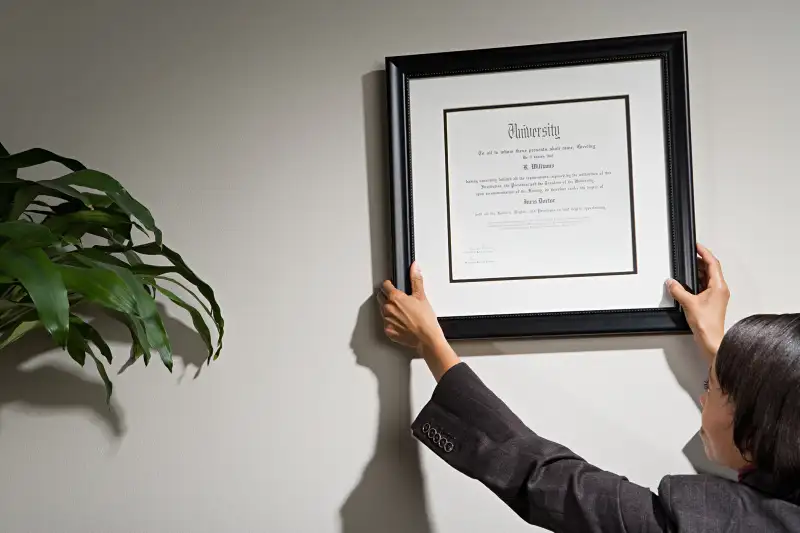College Isn’t Just About Money

What is the point of a college education? A growing number of rankings suggest the gold standard is making the most money possible as quickly as possible. The Department of Education succumbed to this measure in its College Scorecard, using alumni salaries six years after graduation as a prime measure, now spawning a surge of rankings by salary.
Jobs are essential, but is it right for graduates to be valuing their degree, six years or 20 years out, against a national average salary? Is that the right measure for students, or for society? Behind that data point, there are very real and very full lives.
Take, for example, a few young alumni that I know. Since graduating, Catherine Craig delayed her income to continue her studies for a joint law degree from Northeastern University and a master’s in environmental law and policy from University of Vermont Law School. (Craig received a scholarship from our college to help fund law school.) She said a highlight of her graduate studies was serving on a climate delegation at the United Nations 2014 Climate Conference in Peru. “Amazing,” is how she described it, adding she has no mixed feelings about investing her early years to earn two advanced degrees and work with global environmental leaders.
Craig recently landed a job as a clerk to the Vermont legislative council, where she’s writing environmental laws. “Martin Luther King thought being a lawyer was an incredible tool kit for being peacefully disruptive,” she said. “I feel I have a tool kit for social change.”
Nearly five years after graduation, Mike Meo just won a research grant from Harvard University Graduate School of Design’s Mexican Cities Initiative. Now studying full-time for a master’s in architecture, Meo has worked on design-build projects in the United States, South Korea, the Philippines, and Colombia. For his fellowship project, En Bici (On Bike), Meo is researching bike cultures in Mexico City toward influencing the designs of cities and towns. An outgrowth is his project Todos en Bici, through which Meo aims to make bike-based exploration accessible to people with disabilities. Just recently he led 20 bikers of all ages, including blind and deaf riders and those with other disabilities, on an 800-mile trek across the Baja California desert. He wrote in his blog, “I hope to expose people to the potentially transformative nature of bicycle travel, and to prove it can be made more accessible.”
Nearly six years since graduating, Julia Buntaine hasn’t searched for the highest-paying job. Instead, she earned a master’s degree in fine arts and launched the nonprofit ventures SciArt in America magazine and SciArt Center that advance collaboration between the science and art communities in the Northeast and nationwide. She works in development for a New York nonprofit that unites artists with students to create public art and revitalize neighborhoods.
Buntaine has exhibited her artwork at shows in five cities, and her pioneering work is featured in many national publications including a New York Times feature that said it “shows the beauty of data culled from neuroscience.”

I would venture to say the vast majority of alums who graduated about six years ago are living the richest of lives by their own value system and following their own path. Daniel Inkeles is a development executive at Sony Pictures Animation, Vibhu Norby, a technology entrepreneur funding projects with venture financing. Lindsay Cope is earning her master’s as one of 10,000 Americans who have served in the Peace Corps in the Philippines since 1961.
Six years out of college, Lupita Nyong’o won an Oscar and launched her extraordinary rise to recognition. I myself performed “below average” by this Department of Education metric—six years after earning my bachelor of arts, I'd just returned from service in the Peace Corps and was in law school.
Most graduates I know are not focused on achieving the highest income possible in six years; they’re focused on turning their interests and passions into the most rewarding vocation possible, maybe monetarily in some cases, but also intellectually, professionally, emotionally, and personally. (We're building a Knowledge and Wellness Commons at our college because education and wellness are integral.)
Ranking colleges by alumni earnings penalizes colleges for alums who choose public service, the arts, nonprofits, education, social science, and graduate school. Six-year-out salary rankings even discount the value of young entrepreneurs who take risks early in their career that may ultimately lead to big rewards for them and society, maybe 15 years or 30 years after graduation. At Hampshire, two-thirds of our alums invest time to earn advanced degrees within 10 years of graduating, and a third describe themselves as entrepreneurs. Less-than-average? Of course not.
Reporting salaries is just a piece of the story. Each student and graduate should develop their own system of valuing their education. What if the scorecard reported what alums do with their education and how they feel about the value they received? Alumni after all are the experienced consumers, and consumer rating systems are ubiquitous online these days. The Department of Education certainly can find more sophisticated ways to represent the expansive, far-reaching value of education.
Hampshire College President Jonathan Lash is a widely recognized leader in higher ed and the environment who chaired President Bill Clinton's Council on Sustainable Development, was president of World Resources Institute environmental think tank in Washington, D.C., and before that, served as the State of Vermont’s environmental secretary and commissioner. He holds a law degree and master’s degree in education from Catholic University of America and a bachelor’s from Harvard College. After college, he joined the Peace Corps and served in the Dominican Republic.
